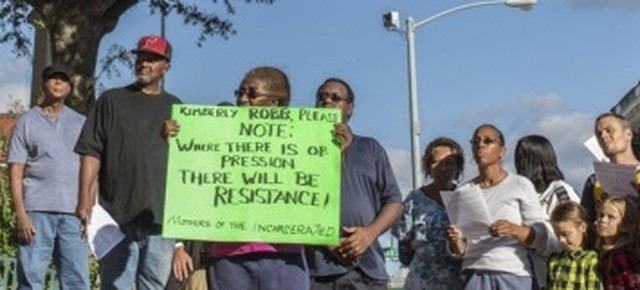People’s Grand Jury charges “racial disparities rampant in Pitt County, N.C., criminal system”
The movement against police and court violence against Black youth is as vibrant in small towns in the U.S. South like Greenville, N.C., as in industrial cities like Oakland, Calif., and Baltimore.
In the afternoon of Oct. 6, community members in Greenville joined activists from the Mothers of the Incarcerated and the Pitt County Coalition Against Racism (CAR) to hold a People’s Grand Jury. That body charged local District Attorney Kimberly Robb and former District Attorney Clark Everett with illegal racial bias in their decisions to prosecute Black people while ignoring crimes committed by whites.
Next the two groups plan to take their demands to Raleigh, the state capital, for a Nov. 14 People’s Trial to be held outside the state bar association.
Racial disparities in the criminal justice system are as overwhelming in Pitt County as they are across the country. CAR presented data showing Black people are three to four times as likely to be charged with resisting arrest, three times as likely to be charged with misdemeanor possession of marijuana, and one-and-a-half times as likely to be charged with possession of drug paraphernalia. All this despite evidence showing that white people are more likely to be marijuana users.
The racist disparities are evident not only in the charging decisions made by the district attorneys, but in the actions of the police. Statistics compiled by UNC-Chapel Hill professor Frank Baumgartner show that the Greenville Police Department is 72 percent more likely to search a Black person at a traffic stop than a white person. (tinyurl.com/o4tva25)
Greenville is neither unique nor particularly backward. This city of over 90,000 is home to one of the largest universities in the state and has a highly educated population. Unlike most neighboring towns in Eastern North Carolina that have lost population following the 1994 NAFTA trade agreement with Canada and Mexico that expedited the loss of over 100,000 mill jobs in North Carolina, Greenville’s large hospital, university and medical school have fueled its growth. Despite this development, the racist attitudes of the police and courts remain the same as under the era of racial discrimination and segregation known as Jim Crow.
Two of the mothers who testified experienced the racism of the courts in seemingly opposite ways. They were both clear that their stories had roots in the same oppression. Sharon Carter’s 20-year-old African-American daughter was killed two years ago by a young white man, Mitchell Wilkerson, whose family has strong ties to Greenville authorities. Wilkerson was texting while driving, but was ultimately given only a $25 fine and no jail time.
Sarah Blakely testified about her son, Donte Sharpe, who has served 22 years for a murder he did not commit. Despite the efforts of the Innocence Project at Duke University Law to reopen the case, both DAs Robb and Everett oppose a new trial for Donte Sharpe.
The Mothers of the Incarcerated and CAR are committed to the struggle against the racist police and criminal justice system and won’t stop here. They have held demonstrations in solidarity with Mike Brown, the young Black man killed by police in Ferguson, Mo., in the summer of 2014, and the Black Lives Matter movement.


